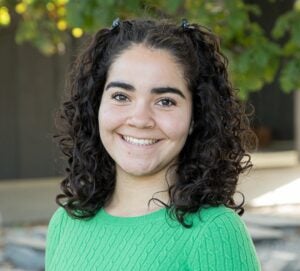
Monica Orozco (left) and friends collect plastic pellets at a local beach cleanup. (Courtesy of Monica Orozco)
Interning with Impact: A Summer with Environment Texas
My story starts with a young me, Monica Orozco, who was certain she was a science and math person–in fact, even better with numbers than people. When I discovered my love for the environment and my passion towards bettering it, I thought that would be through technology, lab research, and engineering. I disregarded the possibility of environmental policy, government initiatives, and advocacy. However, my Gold Award project starting a food waste project showed me that I had the skills to connect groups of people together for a certain cause, bettering my community through organization and environmental advocacy. I knew that being an environmental studies major at USC would allow me the opportunity to leave the door open to both futures.
As arguably the biggest issue that is facing our planet, climate change poses a huge threat to our livelihood and the future of the earth. When I first discovered that I could take actions to slow or stop this crisis, I decided to put forth my skills and passion toward bettering the health of our planet and stopping the climate crisis. Although science and technology are certainly a way to apply innovative solutions to the issue, I recognized during my first year at USC that the another important part is convincing local leaders and the community to advocate for certain environmental causes and take steps towards a sustainable future. Although initially I didn’t think I could do this important job, I decided to apply for an internship with Environment Texas to give it a shot and to see if I had the skills for this important work and find love in it.
I decided to give environmental advocacy a chance by applying to be an intern at Environment Texas for the summer. Initially unsure if I should accept the position because it was unpaid and in a field I thought I wasn’t interested in, I decided to try it out and further discern whether or not it was an area I was interested in pursuing. Thanks to the Scully Undergraduate Scholarship I received, one of the Wrigley Institute Environmental Summer Awards, the unpaid nature of the internship no longer held me back from trying out a career in an area I never would have considered.

At the start of my internship, my boss had me primarily focus on working with the Houston City Council to end their chemical recycling collaboration with ExxonMobil, a form of recycling that is known to be unsustainable and worse than putting plastic in the landfill. I attended Council budget meetings to advocate for environmental sustainability through financial support for Fiscal Year 2025.
After this work, I helped PIRG, the Public Interest Research Group, compile a list of manufacturers that produce plastic pellets by researching about 100 different companies’ plants. This information was then compiled with others’ work to produce a map that dictates which plants produce plastic pellets so we can better identify who is the problem and which waterways are being affected.
Later, we used this map to host a plastic pellet cleanup in a local beach, which I would say was my most memorable experience. I was able to bring some friends to the beach with me as we unveiled the map and were initially given 10 minutes to pick up as many pellets as we could. The group collected about 1,000 pellets in just those first 10 minutes! Afterward, my friends wanted to continue collecting pellets so we stayed on the beach until we noticed that everyone else was gone. Despite being in about 95-degree humid Texas heat, my friends–who typically show no heightened interest in environmental protection–were excited to learn about and join my campaign helping clean pellets off the beach!
Throughout my summer, I also wrote different research articles for the Environment Texas website. My first one investigated why petrochemical plants release extra emissions during extreme weather events, which was super relevant as my hometown of Houston, Texas, was undergoing various tropical storms and even a hurricane! Another memorable experience tied to this topic occurred when a local woman offered for me and my boss to come to her house because she had a beautiful view of the Houston Ship Channel but also all the refineries. Hearing stories of her community and how it has transformed, while also seeing her beautiful view obstructed by so many polluting plants, stuck with me. Finally, I also researched Biden’s Energy Efficiency and Conservation Block Grant Program, specifically the grant given to Houston and what it was allotted for, as well as the different nuances of plastics recycling for research articles.
This internship taught me that despite my initial rejection of the humanities side of environmental studies, I definitely have what it takes and interest enough to not count it out quite yet. As I go through my undergraduate education, I will certainly leave the door open to a career in environmental advocacy and policy, and maybe even pursue other internships in that area. Moreover, I most definitely gained more admiration for those working in advocacy groups. Their work trying to persuade the community and local government leaders is some of the hardest work out there, but extremely important if we want to form more sustainable communities.
You need the support of your community as well as your local leaders to successfully work towards bettering the environment and curbing the effects of climate change, and I see that now thanks to my summer internship experience with Environment Texas.